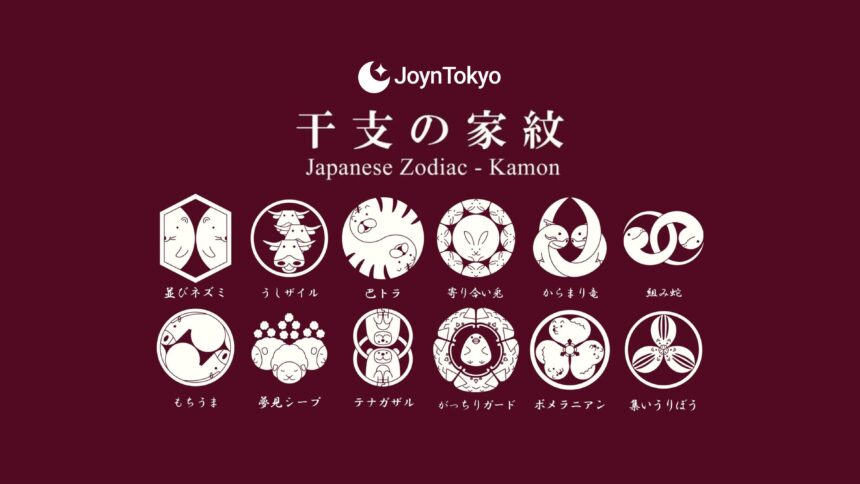Learning about the twelve signs of the Japanese zodiac, known as juunishi (十二支), can be an eye-opening insight into Japanese culture. Unlike the Western zodiac — which is based on constellations with the sign changing monthly — the Japanese zodiac follows a 12-year cycle represented by animals, each carrying cultural meanings. Knowing about the juunishi will help you understand certain New Year customs and milestone birthdays, as well as make small talk with Japanese friends.
The Origin and Meaning of the Japanese Zodiac
The Japanese zodiac, or eto (干支), was imported from China around the 6th Century, and gradually became a part of Japan’s calendar and cultural life. Each year is associated with one of twelve animals, meaning the cycle will repeat every twelve years. These animals are believed to influence personality traits, destiny, and compatibility. Beyond fortune-telling, zodiac animals appear in New Year rituals, temple decorations, and even daily items like stamps and calendars.
The Juunishi System
The word juunishi literally means “twelve branches.” When combined with the jikkan (ten heavenly stems), it creates a 60-year cycle called kanreki (還暦), celebrated as a milestone birthday. The twelve animals are: Rat, Ox, Tiger, Rabbit, Dragon, Snake, Horse, Sheep, Monkey, Rooster, Dog, and Boar. Each is thought to embody qualities that shape the character of people born in those years.
Additionally, there are five element signs that are associated with different additional traits. These are wood, associated with planning and idealism; water, the element of the sympathetic and the perfectionist; fire, thought to imbue courage and passion; earth, which gifts leadership and honesty; and finally metal, which makes people of its element persistent and determined.
The Zodiac Race Legend in Japan
A popular folk tale explains the order of the zodiac. According to legend, the gods declared that the first twelve animals to place in a race would represent the years. The Rat cleverly rode on the Ox and jumped ahead at the last moment.
The Tiger and Rabbit followed with strength and agility, while the Dragon, though powerful, arrived later because it stopped to help others. The Snake slipped in beside the Horse, the Sheep, Monkey, and Rooster cooperated to cross a river, and the Dog was delayed by play. The Boar, fast but careless, came last. This story not only explains the order but also reflects the symbolic traits of each animal.
An additional myth explains the lack of house cats, a favorite animal of many in Japan and around the world. Legend has it that, wanting less competition, the crafty rat told the cat that the day of the race was one day later. The cat, satisfied that it had time, slept through the entire race, and so missed its chance to be a part of the zodiac. This also explains why cats throughout the ages have hated and hunted rats (though the real reason is likely that domestic cats were not popular in 6th Century China).
List of Japanese Zodiac Signs and Their Traits
Each zodiac animal is linked to specific years. People born in those years are said to share the traits of the animal, which often appear in Japanese stories, art, and traditions. Below you’ll find each animal with example years and the qualities they represent.
| Zodiac Sign | Years (examples) | Traits |
|---|---|---|
| Rat (子) | 2020, 2008, 1996, 1984, 1972, 1960, 1948, 1936, 1924, 1912 | Clever, resourceful, adaptable; symbol of fertility and prosperity |
| Ox (丑) | 2021, 2009, 1997, 1985, 1973, 1961, 1949, 1937, 1925, 1913 | Patient, diligent, steady, trustworthy |
| Tiger (寅) | 2022, 2010, 1998, 1986, 1974, 1962, 1950, 1938, 1926, 1914 | Courageous, independent, strong-willed, natural leaders |
| Rabbit (卯) | 2023, 2011, 1999, 1987, 1975, 1963, 1951, 1939, 1927, 1915 | Gentle, elegant, compassionate; linked to the moon and mochi folklore |
| Dragon (辰) | 2024, 2012, 2000, 1988, 1976, 1964, 1952, 1940, 1928, 1916 | Powerful, charismatic, ambitious; only mythical creature in the cycle |
| Snake (巳) | 2013, 2001, 1989, 1977, 1965, 1953, 1941, 1929, 1917, 1905 | Wise, intuitive; associated with protection and good luck in money |
| Horse (午) | 2014, 2002, 1990, 1978, 1966, 1954, 1942, 1930, 1918, 1906 | Energetic, sociable, passionate; symbol of freedom |
| Sheep (未) | 2015, 2003, 1991, 1979, 1967, 1955, 1943, 1931, 1919, 1907 | Kind, artistic, sensitive; strong appreciation for beauty |
| Monkey (申) | 2016, 2004, 1992, 1980, 1968, 1956, 1944, 1932, 1920, 1908 | Clever, playful, quick-witted; linked to “Three Wise Monkeys” |
| Rooster (酉) | 2017, 2005, 1993, 1981, 1969, 1957, 1945, 1933, 1921, 1909 | Punctual, confident, hardworking; enjoy recognition for efforts |
Rat (Nezumi – 子)
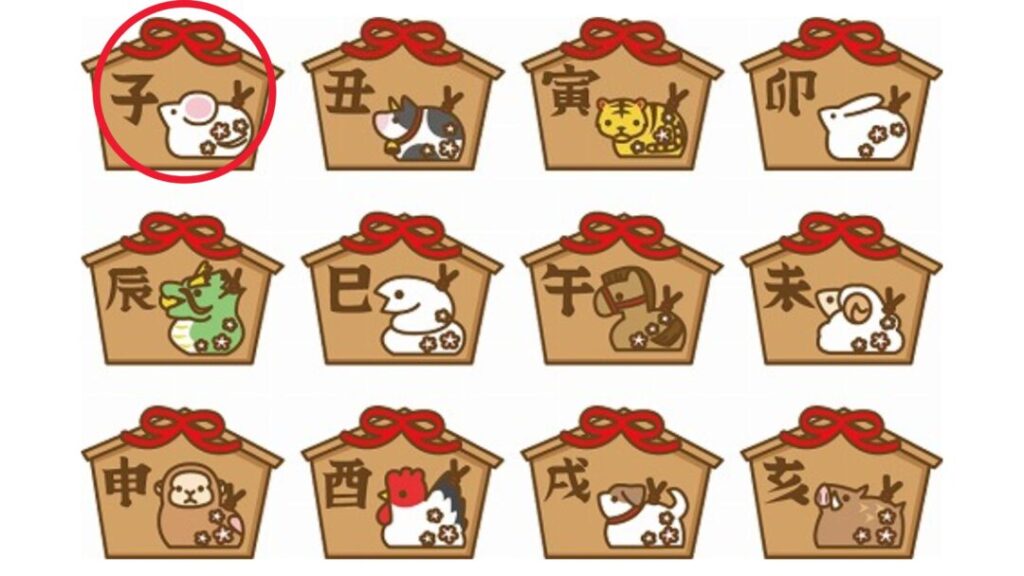
Years: 2020, 2008, 1996, 1984, 1972, 1960, 1948, 1936, 1924, 1912
People born in the year of the Rat are often seen as clever, resourceful, and adaptable. They tend to be quick thinkers, skilled at finding solutions under pressure, and naturally good at networking.
In Japanese culture, the Rat symbolizes fertility and prosperity, and is associated with abundant harvests and wealth. Because of their charm, Rat-born individuals usually have wide social circles, though they may sometimes be perceived as opportunistic.
Ox (Ushi – 丑)
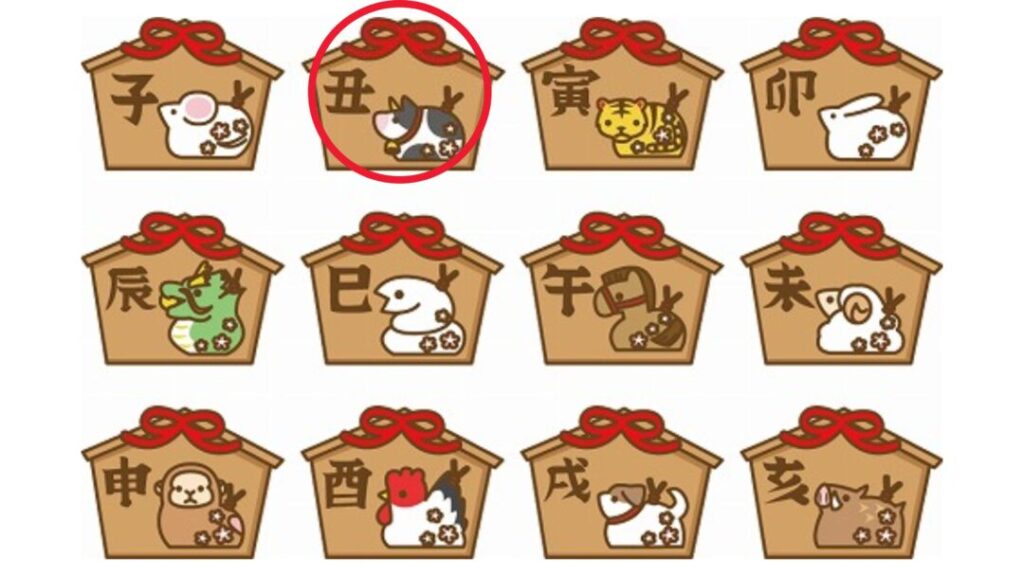
Years: 2021, 2009, 1997, 1985, 1973, 1961, 1949, 1937, 1925, 1913
The Ox represents patience, perseverance, and diligence. People under this sign are admired for their endurance, reliability, and ability to achieve long-term goals. They are often slow but steady workers, gaining respect for their persistence rather than quick success.
In Japanese tradition, the Ox is also linked to agriculture and represents the backbone of rural life, symbolizing strength in hardship. However, Ox-born individuals may sometimes be seen as stubborn or inflexible.
Tiger (Tora – 寅)
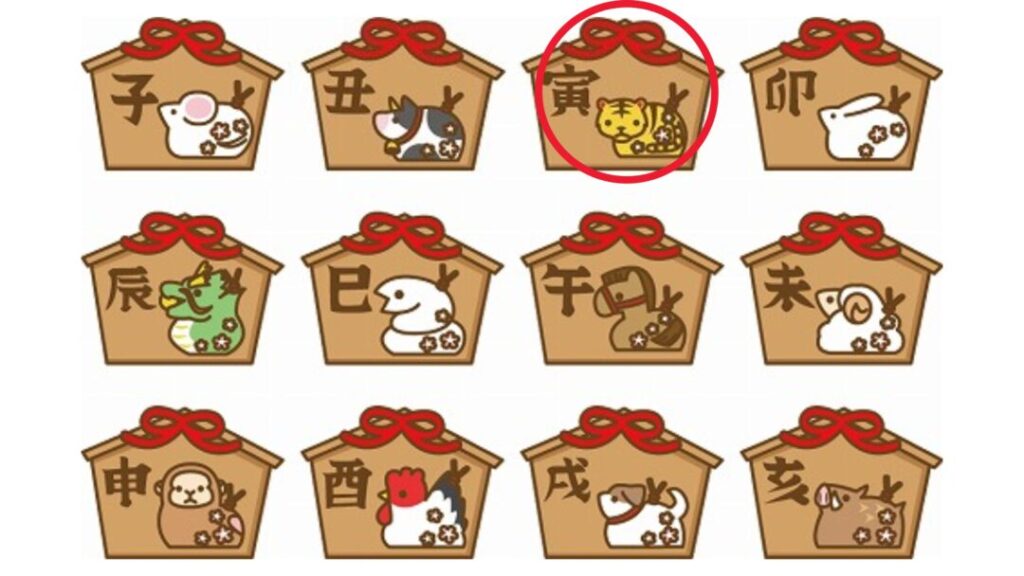
Years: 2022, 2010, 1998, 1986, 1974, 1962, 1950, 1938, 1926, 1914
The best sign, the Tiger symbolizes courage, independence, and passion. People born under this sign are considered brave leaders, unafraid of taking risks or standing up for what they believe in. They are charismatic and often attract followers. Their strong will can sometimes come across as aggressive or impulsive.
In Japanese culture, tigers are protectors against evil spirits, appearing on samurai armor or temple paintings as guardians of strength.
Rabbit (Usagi – 卯)
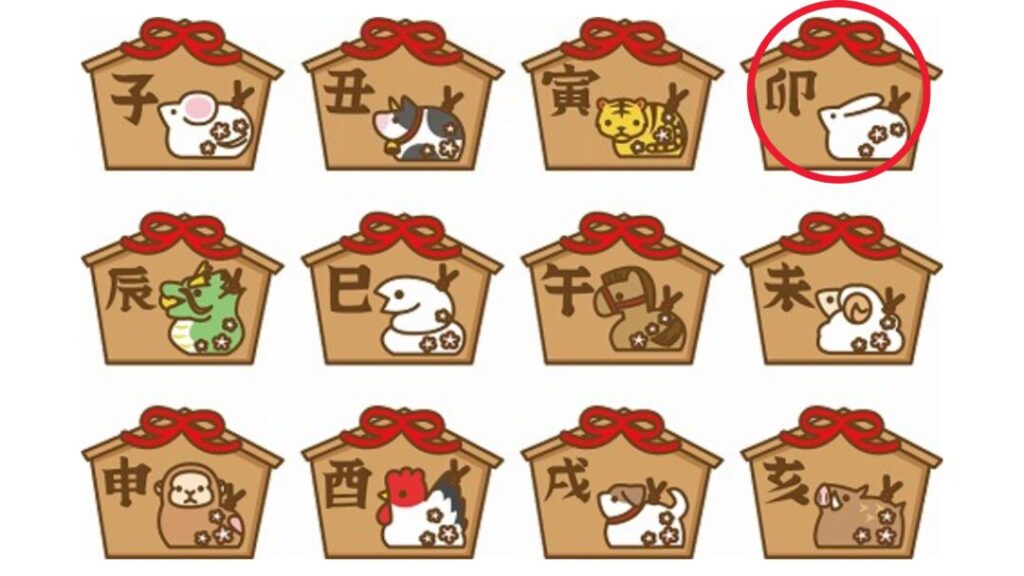
Years: 2023, 2011, 1999, 1987, 1975, 1963, 1951, 1939, 1927, 1915
Rabbits are gentle, elegant, and compassionate. They are viewed as diplomatic, avoid conflicts, and bring harmony to their surroundings. Rabbit-born people are known for artistic talent, refined tastes, and sensitivity, making them excellent in creative fields.
In Japan, the Rabbit is tied to the moon: folklore says a rabbit lives on the moon making rice cakes (mochi), symbolizing both kindness and mystical beauty. Their weakness may be over-caution or avoiding responsibility.
Dragon (Tatsu – 辰)
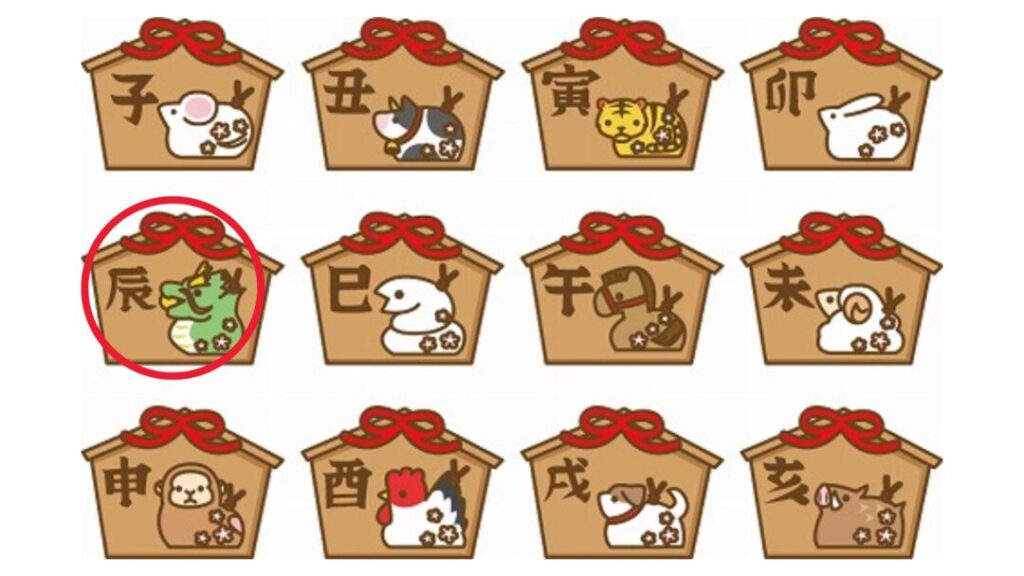
Years: 2024, 2012, 2000, 1988, 1976, 1964, 1952, 1940, 1928, 1916
The Dragon represents power, charisma, and ambition. It is the only mythical zodiac animal, bestowing it an aura of mystery and reverence. People born in Dragon years are seen as visionaries, as well as confident and dynamic leaders with a strong sense of destiny.
In Japanese temples, dragons are protectors of water and agriculture, appearing in carvings and paintings. Their bold energy can inspire others, but they may also be perfectionists or overly demanding.
Snake (Hebi – 巳)
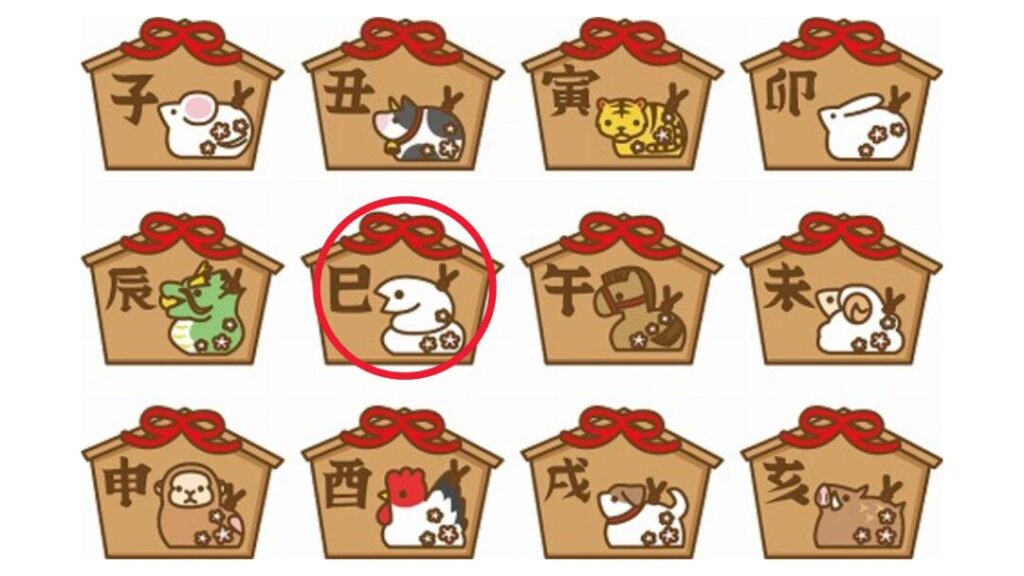
Years: 2013, 2001, 1989, 1977, 1965, 1953, 1941, 1929, 1917, 1905
Snakes symbolize wisdom, intuition, and mystery. Snake-born individuals are thoughtful and analytical, often preferring to observe before acting. They have strong intuition, making them good at reading situations and people.
In Japanese culture, snakes are associated with protection, especially regarding money. White snakes are considered sacred and bringers of fortune. However, Snake personalities may sometimes be secretive or overly cautious.
Horse (Uma – 午)
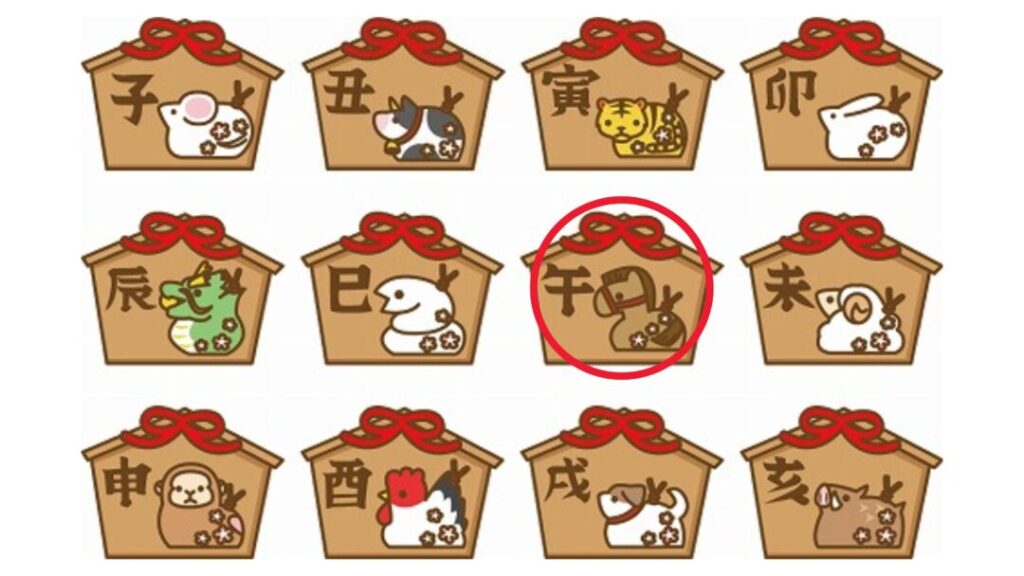
Years: 2014, 2002, 1990, 1978, 1966, 1954, 1942, 1930, 1918, 1906
The Horse represents energy, freedom, and sociability. People born under this sign are lively, adventurous, and often drawn to travel or outdoor activities. They are natural entertainers, full of enthusiasm, and usually have many friends.
In Japanese tradition, horses were once considered messengers of the gods, often kept at shrines. While Horse individuals are passionate, they can also be restless or impatient, moving quickly from one interest to the next.
Sheep (Hitsuji – 未)
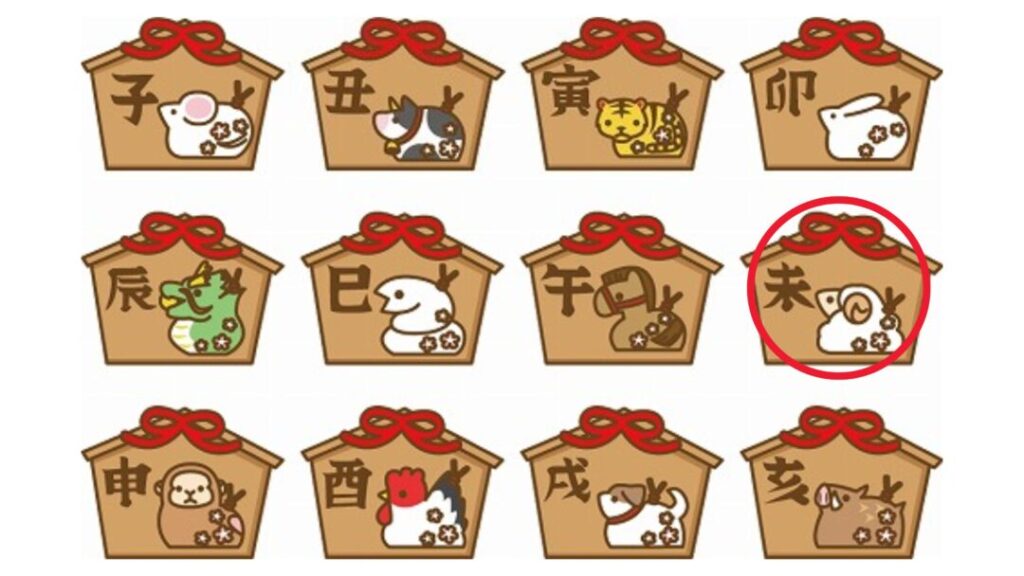
Years: 2015, 2003, 1991, 1979, 1967, 1955, 1943, 1931, 1919, 1907
Sheep symbolize harmony, creativity, and kindness. People born in Sheep years are seen as artistic, sensitive, and empathetic, with a deep appreciation for beauty and nature. They value peace and avoid confrontation, preferring cooperation and compassion.
In Japan, the Sheep is linked to comfort and community, representing nurturing and calmness. Their gentle nature is admired, but they may sometimes be seen as overly dependent or indecisive.
Monkey (Saru – 申)
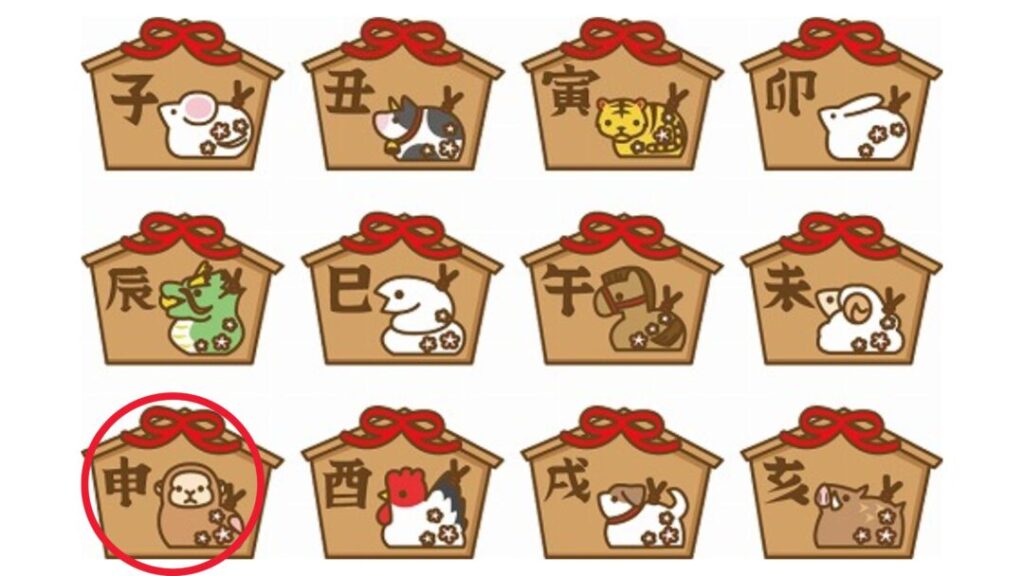
Years: 2016, 2004, 1992, 1980, 1968, 1956, 1944, 1932, 1920, 1908
Monkeys are clever, playful, and quick-witted. People born under this sign are adaptable and curious, often excelling at problem-solving or improvisation. They are charismatic and humorous, but sometimes too mischievous or prone to taking shortcuts.
In Japan, monkeys are linked to the famous “Three Wise Monkeys” at Nikkō, symbolizing “see no evil, hear no evil, speak no evil.” Their lively spirit makes them entertaining, but they may struggle with focus.
Rooster (Tori – 酉)
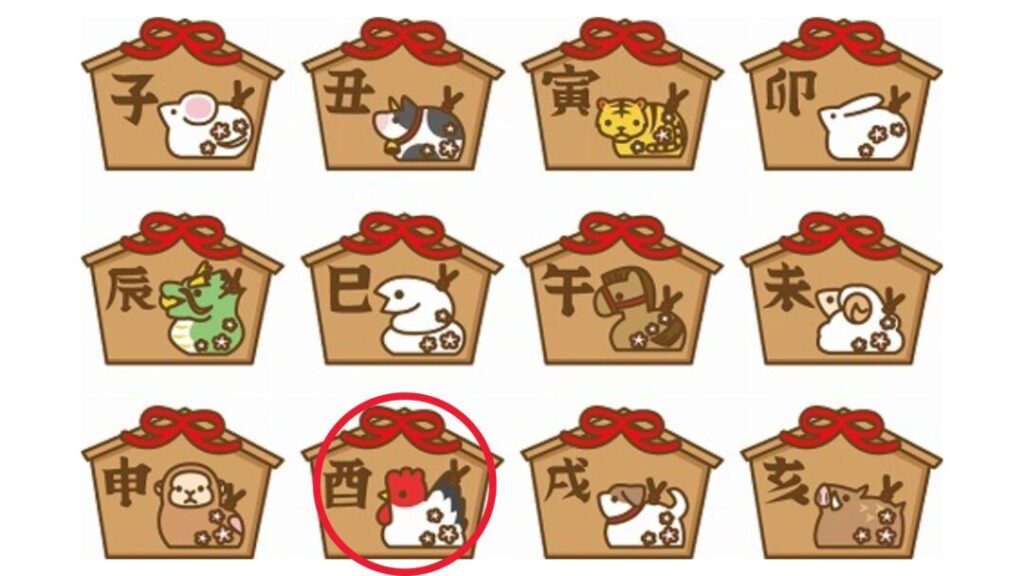
Years: 2017, 2005, 1993, 1981, 1969, 1957, 1945, 1933, 1921, 1909
The Rooster stands for punctuality, confidence, and hard work. Rooster-born people are meticulous, detail-oriented, and take pride in their achievements. They often have strong organizational skills and a love for structure, making them reliable in leadership roles.
In Japan, roosters are sacred in Shinto, as their crowing was believed to greet the sun goddess Amaterasu. While respected for their diligence, they can also be perceived as stubborn or overly proud.
Dog (Inu – 戌)
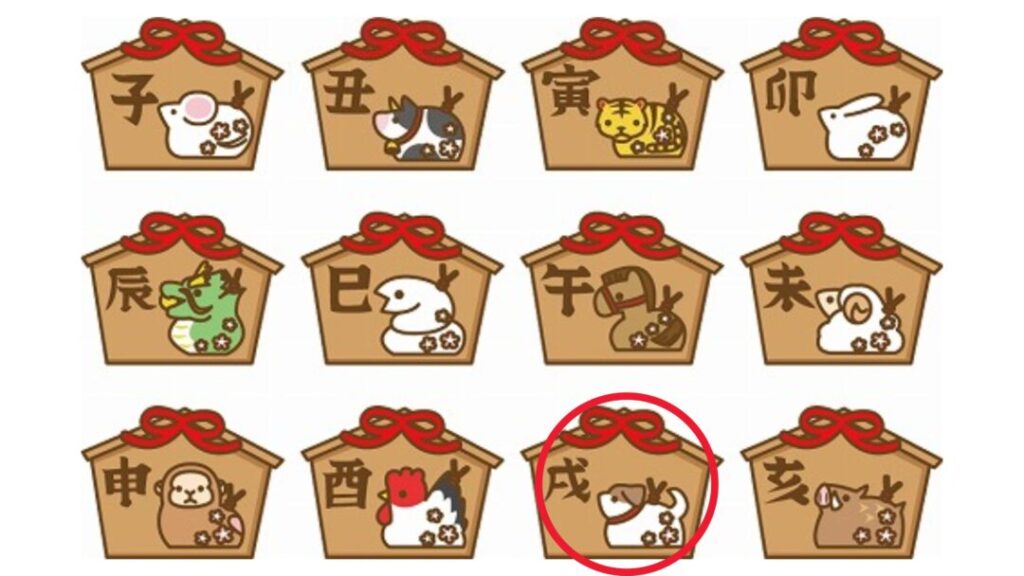
Years: 2018, 2006, 1994, 1982, 1970, 1958, 1946, 1934, 1922, 1910
Dogs symbolize loyalty, honesty, and protection. People born in Dog years are admired for their integrity and strong sense of justice. They are dependable friends and partners, always ready to defend those they care about.
In Japanese folklore, dogs are protectors against evil and bringers of safety to families. Dog personalities are trustworthy but can sometimes be overly critical or anxious.
Boar (Inoshishi – 亥)
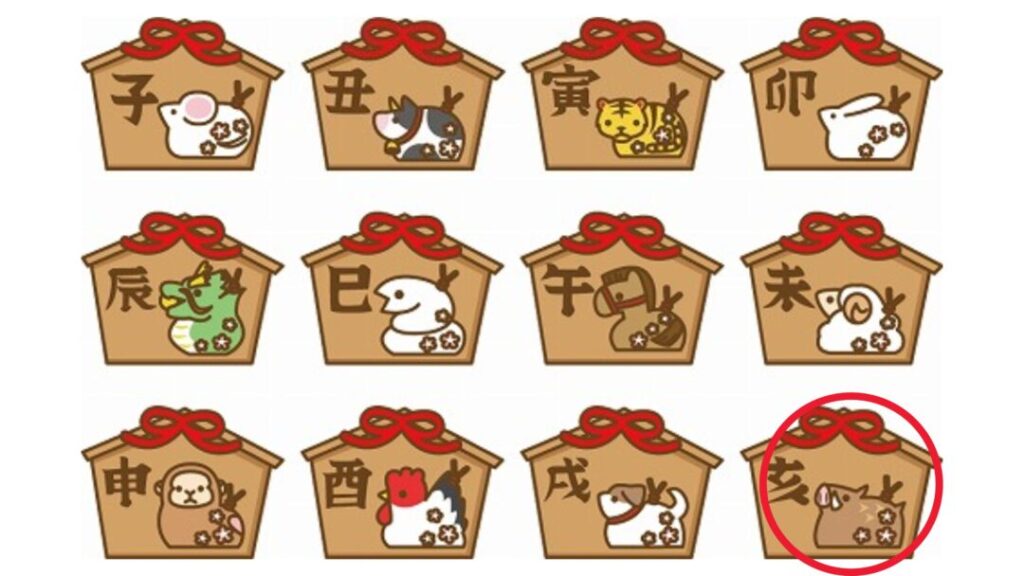
Years: 2019, 2007, 1995, 1983, 1971, 1959, 1947, 1935, 1923, 1911
The Boar represents bravery, passion, and determination. People born under this sign are straightforward, resilient, and goal-oriented. They are admired for their honesty and strong will, often tackling challenges head-on without hesitation.
In Japanese culture, wild boars symbolize courage and fertility, and they are featured in many regional myths. Their boldness can be inspiring, though at times they may come across as reckless or too blunt.
Japanese Zodiac Signs in Daily Life
In Japan, zodiac animals are most visible during New Year (oshōgatsu). Greeting cards (nengajō) often feature the year’s animal, and shrines sell charms (omamori) decorated with it for good luck.
Wooden prayer plaques (ema) also carry animal designs, such as rabbits during the Year of the Rabbit. Families sometimes choose baby names or wedding dates based on zodiac compatibility.
One’s 60th birthday (kanreki) is another key moment, as it means that you have been through the elements five times, meaning that you are back to the year and element of the sign of your birth. For example, if you are a fire Tiger, your sixtieth year is the first year of the fire tiger in 60 years. Beyond rituals, you’ll also find zodiac motifs in calendars, stationery, and souvenirs across Japan.
The Japanese zodiac, or juunishi, is more than just a fun personality test. It reflects centuries of tradition, folklore, and everyday culture. For international residents in Japan, knowing the zodiac can help with understanding New Year customs, appreciating symbolic art, and joining in conversations about personality and fate. Whether you’re writing a New Year card or visiting a shrine, understanding the juunishi offers a meaningful way to connect with Japanese society.

